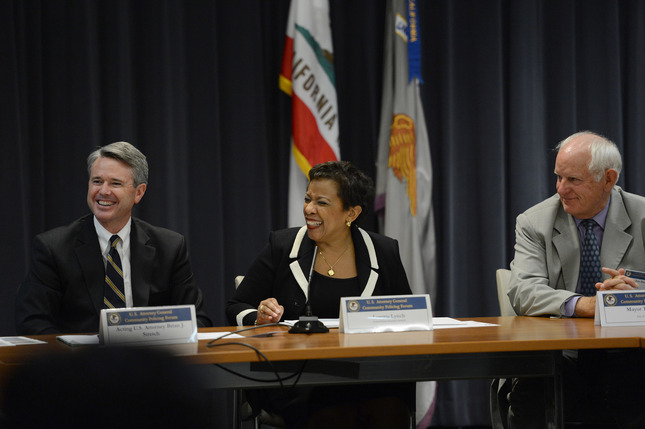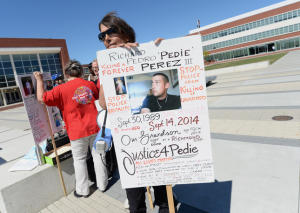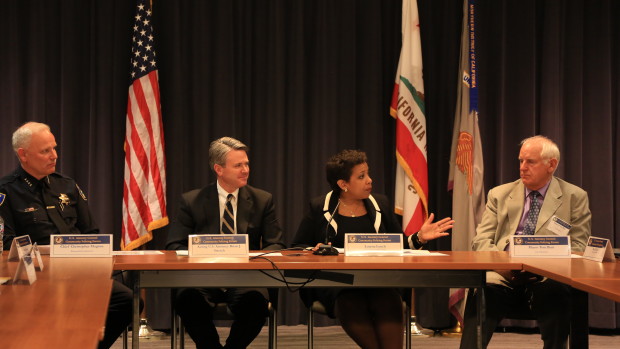Richmond: U.S. Attorney General Lynch meets with police, youth
By Karina Ioffee kioffee@bayareanewsgroup.com
Posted: 09/25/2015 09:45:51 AM PDT | Updated: about 13 hours ago

The United States Attorney General Loretta Lynch, center, shares a laugh with Richmond Mayor Tom butt, right and Acting U.S. Attorney Brian Stetch, left, prior to holding a town-hall-style meeting in Richmond on Sept. 25, 2015. (Dan Honda/Bay Area News Group)
RICHMOND -- U.S. Attorney General Loretta Lynch met with Contra Costa officials, law enforcement and teens during a stop Friday in Richmond, part of a national tour aimed at improving relations between police and residents and highlighting effective community-policing strategies.
"No issue is more important than the issue of police-community relations in this day and age," Lynch said, mentioning last year's violence in Ferguson, Missouri, after the shooting death of a young man stopped for allegedly stealing a pack of cigarillos.
"Those incidents reflect years and generations of negative interactions and mistrust that come together in flash-point situations and turn into conflagrations."

Julie Perez, of Pinole, protests outside Richmond City Hall during a visit by U.S. Attorney General Loretta Lynch on Sept. 25, 2015. Perez is seeking justice in the shooting death of her son, Richard "Pedie" Perez, by a Richmond police officer last September. (Dan Honda/Bay Area News Group)
During her visit, Lynch, who was sworn in this April and is the first African-American woman to hold the post, met with Richmond youths and spoke with officers from the Richmond Police Department, both of which meetings she described as candid discussions. She also met with female law enforcement chiefs to discuss women in leadership and held a round-table talk with representatives from community organizations and schools. All meetings were closed to the news media.
Richmond is one of six cities Lynch is visiting on her national tour aimed at highlighting positive police practices and restoring trust; the others are Cincinnati; Birmingham, Alabama; Seattle; Pittsburgh; and East Haven, Connecticut,
During her public comments, Lynch highlighted the Richmond Police Department's early adoption of body cameras, which went into effect this winter; training on implicit bias; and programs such as Operation Ceasefire, which addresses gun violence by pulling in police, probation officers and community groups.
"It's clear to me that Richmond is working toward a holistic and comprehensive approach to criminal justice that is more than just an arrest but is trying to identify many of the causes that lead people to connect with the criminal justice system in the first place," Lynch said.
During a stop at the RYSE Youth Center, which offers mentoring, counseling, classes and peer groups, Lynch met with 12 young people to hear about what they wanted to see from law enforcement. There, she was told that while Richmond police have made many improvements in their interactions with residents, officers still needed more training, especially in their interactions with young people, said Kimberly Aceves, executive director of RYSE.
Another concern was school resource officers and the so-called "schools-to-prison pipeline" that critics say makes students of color more likely to get suspended and expelled than their white peers.
"Many young people feel that the boundaries between police and education get blurred and there needs to be another way to ensure a safe environment," Acevedo said about the SROs.
Outside City Hall, Lynch was greeted by a group of residents protesting last year's shooting death of Richard "Pedie" Perez, a 24-year-old unarmed man who was killed after an altercation with a police officer. The Perez family and their supporters want an independent inquiry into the death. They have also filed a federal lawsuit and say they aren't willing to settle.
"We want U.S. Attorney General Loretta Lynch to know that all is not well in paradise," said Gerald Smith, a member of the Oscar Grant Committee, which advocates against police brutality.
Since being sworn in, Lynch has pushed improving community relations. She launched a review of the Baltimore Police Department after the death of a black man who was in police custody and met with civil rights leaders and law enforcement in Baltimore and Cincinnati in an attempt to regain trust between police and the black community.
Contact Karina Ioffee at 510-262-2726 or kioffee@bayareanewsgroup.com. Follow her at Twitter.com/kioffee.

Attorney General listens to Richmond leaders

U. S. Attorney General Loretta Lynch address community leaders of Richmond including Mayor Tom Butt (right) and Police Chief Chris Magnus (far-left). (Photo by Manjula Varghese)
By Matt BeaglePosted September 25, 2015 11:32 pm
U.S Attorney General Loretta Lynch came to Richmond on Friday, ending a national tour in a city starting to shake off its reputation as a crime capital.
Lynch, addressing a cross-section of community leaders in the Richmond City Council chambers Friday, said she wanted to learn from cities that have “fought their way back from the brink.”
Richmond has been attracting recognition as a model of improved community and police relations. Yet on Friday, a small crowd protested before Lynch spoke, alleging police misconduct in a shooting outside a Richmond liquor store last year.
Lynch met with police officers and high school students earlier in the day before meeting at City Hall with about 25 civic leaders including Mayor Tom Butt and other members of the Richmond City Council, Police Chief Chris Magnus, court representatives, religious and nonprofit leaders and students.
Lynch said no issue was more important than addressing police and community relationships. She referred to recent high-profile incidents that have occurred from Ferguson to Baltimore as “flash points” in a long history of mistrust.
Her visit underscored recent portrayals of Richmond as a city moving in the right direction. But no one was claiming all the work has been done.
Magnus echoed this sentiment when he spoke with reporters before Lynch’s remarks.
“We are not here to say ‘mission accomplished.’ We expect to hear candid observations from the community today,” he said.
A dozen or so people staged a rally outside City Hall before Lynch spoke. The protest, led by the Oscar Grant Committee Against Police Brutality and State Repression, concerned the shooting death of Richard “Pedie” Perez III by a Richmond police officer last year.
Protesters said the city is blocking an independent investigation called for by the Perez family. Lynch made no public comment on the case and took no questions from reporters.
Doria Robinson, executive director of Urban Tilth, an outdoor education initiative, said the dynamic between Richmond citizens and police is complicated by the different attitudes of individual officers. Some are doing an exemplary job of community engagement, and some may not be, she said.
Ruben Canedo of the University of California at Berkeley said the attorney general seemed “very receptive” to the message she heard from community figures.
“The fact that she came to Richmond says a lot,” Canedo said. “She’s here to learn from the people doing the work.”
Also see:
| 
